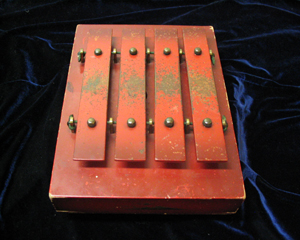The NBC Chimes Museum
A Celebration Of Old–Time Radio’s Most Famous Signature
the deagan 400 series dinner chime

In the early years of the 20th century, The J. C. Deagan Company made a variety of dinner chimes in configurations of three, four, and five chime plates mounted over wooden resonator boxes. The chimes varied in pitch, and the lower the tone of the chime the thicker the resonator box was. By the 1930s the selection had been pared down considerably; one of the few models left in the catalogue was the 400 Series model.
WTMJ Local Chime ID, broadcast February 4, 1931. This is a four–note local identification played on a Deagan No 400 dinner chime. Notes are A♭4–C5–E♭4–C5.
The Fourth Chime on D–Day, first occurrence. From NBC live coverage of D–Day, June 6, 1944. This four chime signal was flashed at 3:19 AM to prepare news personnel for the developing story of the D–Day invasion. A Deagan No 400 dinner chime is used, and an inverted signal of C5–E♭4–A♭4–A♭4 is sounded. The final note continues in a loop due to circuit feedback, which created an unintended reverberation pattern.
The Fourth Chime on D–Day, second occurrence. From NBC live coverage of D–Day, June June 6, 1944. This signal was sent at 3:29 AM, immediately before the Morse Code “V For Victory” signal was sent—a confidential code confirming that the D–Day invasion had actually begun. A Deagan No 400 dinner chime is used; the A♭4 chime plate is struck four times.
The 400 Series was originally available in several colors, including Mandarin Red pictured here; by the early 1950s, it was only available in a Birch Mahogany base with Tuscan bronze chime plates. The chime notes, in ascending order, were E♭, A♭, C, and E♭, with the C being an octave above Middle C. The Deagan 400 series dinner chime sold at retail for $9.00.
The 400 series chime was used for local identification for WTMJ Milwaukee in 1931, of which at least one recording still exists, and on the recording of “The Fourth Chime” as heard on D–Day, June 6, 1944. This chime is also known to have been used for the local chime identification of WCSH in Portland, Maine.
There was a five–note variation (the fifth note being A♭ an octave above the second chime plate), known as the Series 500, which sold for $11.00. For those desiring a wooden-resonator chime box but limited to a budget, Deagan also offered the Series 300 chime. The 300 sold for $8.00, and featured the same four chime notes as the 400 series. The chime plates, however, were of varying lengths rather than Deagan’s traditional process of having the chime plates all the same length but of varying thicknesses. This led to a chime tone that was not so rich or resonant as the 400 Series, but was pleasing to the ear just the same.